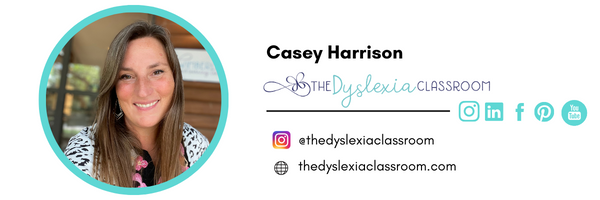Did You Know That October is Dyslexia Awareness Month?
October is Dyslexia Awareness Month! Do you know that dyslexia is a topic around the globe? It's true!
Dyslexia impacts people across all languages, races, socio-economic statuses, and genders. While the prevalence rates for dyslexia may vary somewhat across writing systems, there appears to be core deficits across writing systems in the area of phonological deficits (Goswami, 2015).
I have had conversations with people worldwide regarding dyslexia and its instructional and emotional impacts on our children. We are all seeking the best ways to help close the reading gap and meet student needs in a way that preserves their emotional well-being and sets them up for success.

Unfortunately, there are still people and scholars that think dyslexia does not exist. To that, I say, look at the brain neuroscience, the fMRI, and the years and years of research about dyslexia, and then #saydyslexia because our children deserve to have educators and our society understand their journey.
My mission is to help people better understand dyslexia, dispel myths, and bridge the science of reading research to classroom and dyslexia therapy application and practice.
What We Know About Dyslexia
Dyslexia has nothing to do with intelligence. It is not a thinking disability. The apparent brightness often stumps parents and educators and leads to thinking that a dyslexic student needs to try harder or needs more time.
In a school setting, the understanding that dyslexia has nothing to do with intelligence can be overshadowed by the demands of reading, writing, and the quick pace of instruction. Our children are bright, yet they are sometimes overlooked as their day consists of activities that do not highlight their strengths. Instead, their struggles are on constant display. This constant feeling of playing catchup or struggling can profoundly impact a child's self-esteem, one that can last a lifetime.
We need to understand and help students know that they are intelligent and thrive when taught in a way that works best for their brain's processing system.
Things For Educators and Parents To Reflect Upon
As educators and parents, what opportunities can we provide for our children to showcase and develop their strengths in the academic setting and at home?
Many times, our primary focus is on addressing the deficits associated with dyslexia.
"Dyslexia is an island in a sea of strengths."
- Dr. Sally Shaywitz
The dyslexic brain develops and functions differently, causing challenges and strengths in different areas. And while we need to understand dyslexia needs and how to address them appropriately, we can't ignore the other side of the coin: the individual strengths that lie in every student. A teacher or parent that identifies and promotes those strengths offers a different point of view for a child who may otherwise be surrounded with feelings of failure.
How can we shift traditional assignments to provide our children an opportunity to show what they know in a way that works best for them?
Offering students choices for how they complete an assignment is one way we can do this. Some assignments may lend themselves to be done with different platforms in different ways while still meeting the expected criteria. Students could create slides with images and information, design pamphlets, record themselves explaining their thinking, etc. While this may not be an option for all assignments, providing students with some choices in how they show their knowledge can empower them and provide struggling students with an opportunity to share their expertise in a way that benefits them.
Our children are bright. I am reminded every day when working with my students of just how smart they are. They are creative and inquisitive and thrive when learning connects in a way that unlocks the reading and writing process. I feel honored to be a part of their journey. 🦋
So many of you have asked about making my images into posters! I am gifting you my "Dyslexia Awareness" poster bundle. Enjoy! Click HERE, or on the image, for access to the free resource library of The Dyslexia Classroom where you will have access to this download for the month of October. You'll also have access to the all of the other free resources in the library! If you are already a community member, check out the library for the poster bundle. Be sure to check out all the upcoming events below!
Upcoming Events
- Unlocking SOR conference - a virtual conference for parents and teachers who know there's a better way to help their readers through the science of reading! This conference, held on Oct. 22-23, is full of meaningful presentations from phonology to morphology to comprehension and more all rooted in the research. I will be presenting on "Understanding Dyslexia With the Science of Reading in Mind".
- 🎉The Color-Coding Method to Teaching Sight Words course is open! What if I told you there was an easy way of teaching sight words to help your students move from phonemic awareness to spelling and reading while connecting the science of reading to instructional practices? This course breaks down the research and provides almost 3 hours of PD and tons of resources to set your students up for success. Click here for more details!
- Are you in the state of Virginia? I am excited to present next week to the Virginia Department of Education Region 5 how to integrate games and manipulatives into structured literacy lessons in meaningful ways!

This information is the intellectual property of @2016 The Dyslexia Classroom. Do not use or repurpose without expressed permission from The Dyslexia Classroom. Please give The Dyslexia Classroom an attribution if you use, reference, or quote/paraphrase copyrighted materials. This includes but is not limited to blogs, social media, and resources.




